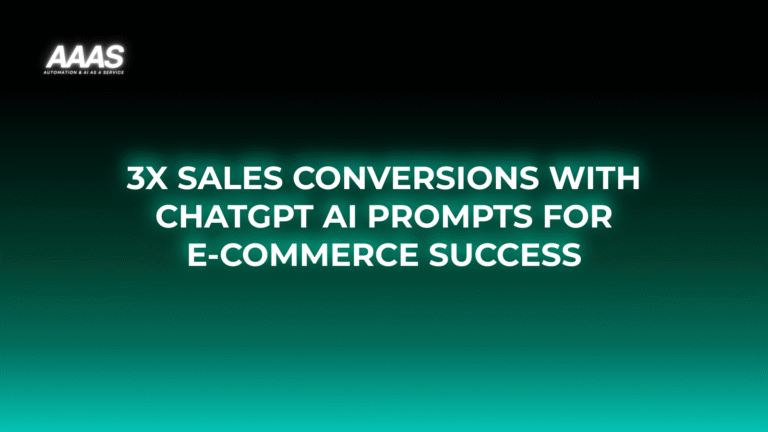ChatGPT Business Prompts for E-commerce: Best Practices to Boost Online Sales with AI Customer Support
Market Problem

Online retailers face increasing challenges in delivering rapid, personalized, and 24/7 customer support. Slow response times, inconsistent service quality, and communication gaps lead to customer frustration, lost sales, and negative reviews. According to Salesforce Research, 78% of consumers have abandoned a purchase due to unsatisfactory support experiences.
AI-Driven Solution & Benefits
Harnessing ChatGPT for E-commerce Customer Support
Integrating ChatGPT business prompts into your online store enables automated, natural conversations that resolve customer queries instantly. With advanced AI-driven chatbots, retailers can:
- Boost conversion rates with real-time answers and recommendations
- Reduce cart abandonment by addressing checkout hesitations promptly
- Scale support operations without increasing staff costs
- Personalize shopping experiences based on user data and behavior
- Achieve 24/7 global availability for support and sales assistance
Real Use Cases
Proven E-commerce Applications of ChatGPT Prompts
- Pre-Sales Inquiry Handling: Answering product questions and providing feature comparisons.
- Personalized Product Suggestions: Recommending items based on browsing and purchase history.
- Order Support: Assisting with order tracking, returns, and refunds.
- Proactive Cart Recovery: Sending automated, conversational reminders to hesitant customers.
- Upselling and Cross-selling: Making tailored offers post-purchase or during checkout.
Case Study: Fashion E-tailer
A leading online fashion retailer integrated ChatGPT-powered chatbots, achieving:
- 21% increase in conversions
- 37% reduction in response time
- 25% fewer abandoned carts
- Significantly improved CSAT scores
Technical Details & Implementation
System Architecture

Typical e-commerce ChatGPT integrations involve:
- Connecting ChatGPT (via OpenAI API) to your website’s live chat widget
- Feeding product catalogs and FAQs into a knowledge base
- Defining business-specific prompts for sales, support, and order handling
- Customizing the chatbot’s voice and escalation paths (to human agents if necessary)
Popular Platforms & Plugins
- Shopify: Apps & integrations
- WooCommerce: Chatbot plugins with GPT integration
- Magento, BigCommerce: Custom API-based solutions
Comparison: ChatGPT vs Other Solutions
| Feature | ChatGPT-Based | Traditional Live Chat | Scripted Chatbots |
|---|---|---|---|
| 24/7 Automation | Yes | No | Yes |
| Natural Language Understanding | Excellent | Human only | Poor |
| Personalization | Advanced | Manual | Limited |
| Setup Complexity | Moderate | Low | Moderate |
| Scalability | High | Low | High (with limits) |
| Cost | $$ | $$$ | $ |
Pricing Table
| Plan | Monthly Cost | Features |
|---|---|---|
| Starter | $19 | 1 store, 1000 chats, basic prompts |
| Professional | $59 | Multiple stores, 10,000 chats, prompt customization, analytics |
| Enterprise | Custom | Unlimited stores/chats, API priority, white-labeling, advanced reporting, dedicated support |
ROI-Focused Practical Examples
- Automated Support = Lower Costs: Cutting support overhead by up to 60% by automating routine inquiries.
- Higher Basket Value: AI-driven upsell prompts boost average order value by 10-20% (see McKinsey).
- Faster Response = More Sales: Reducing reply time from hours to seconds can raise conversion rates by 5-30%.
Setup Steps
- Choose your e-commerce platform and preferred ChatGPT integration (plugin or API).
- Obtain your OpenAI API credentials or select a supported plugin.
- Feed your product catalog, FAQs, and policies into the system.
- Define and refine business-specific prompts (sales questions, support scenarios).
- Test chatbot conversations, reviewing for accuracy and tone.
- Go live and monitor performance (conversion rate, response time, feedback).
- Continuously optimize prompts and escalate complex queries to humans as needed.
Pros & Cons
| Pros | Cons |
|---|---|
|
|
Expert Tips
- Regularly audit and update prompt content for seasonal campaigns, new products, and policy changes.
- Combine ChatGPT support with proactive email/SMS outreach for cart recovery.
- Integrate analytics to identify drop-offs and retrain prompts with real conversations.
- Offer seamless handoff to live agents for VIPs or sensitive issues.
FAQ
- How secure is ChatGPT for handling e-commerce customer data?
- When properly configured, ChatGPT integrations via APIs comply with industry security standards. Always use HTTPS and follow privacy best practices.
- Will ChatGPT work on mobile and desktop?
- Yes, most chat integrations work seamlessly across devices and browsers.
- Can the chatbot handle product-specific questions?
- Yes, provided your product catalog and FAQs are accurately integrated and prompts are well defined.
- Is there a risk of AI making mistakes that harm sales?
- While rare, AI can misunderstand queries. Mitigate this by testing regularly and allowing users to contact a human agent if needed.
References & Citations
- Salesforce Research – Customer Expectations
- McKinsey: Accelerate E-commerce
- OpenAI API Documentation
- Shopify – The Power of Chatbots
Last updated:








